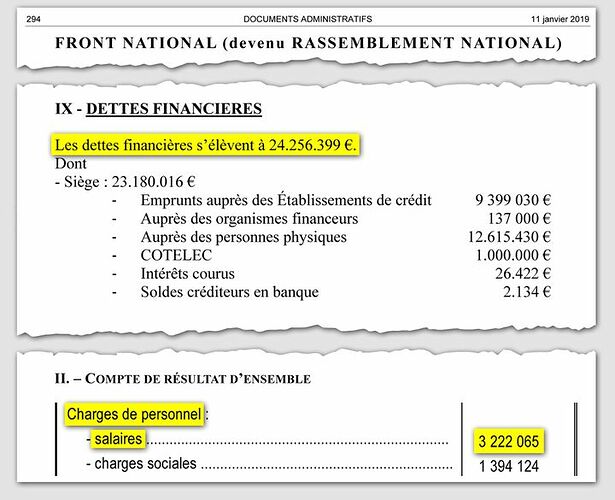He’s certainly been very cagey, I know it’s early days but I wish he would “piss or get off the pot” on this one, we kind of would like to know… It’s a No for me, I don’t think he’ll go for it, 2027 possibly as he’s often talked of or hinted at his ambition to be president, but despite his misgivings about Macron, he won’t want to get in his way IMO and politically that’d be difficult, as even if he runs as the main LR candidate, I can’t see Macron (who will run as an independent candidate then, like last time, I mean unhindered by Primaries) pulling out for him, so that would be a risky strategy for Philippe, he’s much better off waiting for Macron to have retired from top-level French politics, which if he wins next year will be in 2027.
Meanwhile, in the Marine Le Pen’s & the RN’s camp, the serious financial problems that the party has been experiencing for nearly 10 years now are taking their toll.
Campaign costs are starting to be an issue as they have to find the funding for the 4 forthcoming elections, within 15 months (the Régionales and Départementales in June – was to be last month but postponed due to the pandemic –, the Presidentials in spring 2022 and the Législatives in June 2022), starting with the campaign for the Régionales & Départementales held in 2 months’ time.
That is a lot of money to find: €30 millon in the next 15 months (approx. half of that will be for the Presidential campaign), and their revenues are way too low to finance it all. Granted, the £15m spent in the Presidentials will be reimbursed by the State, after a thorough examination of the audit organisation that deals with campaign expenses (the Commission nationale des comptes de campagne et des financements politiques – the CNCCFP) but obviously you have to find the money beforehand, and that’s very tricky now for the RN, they owe a lot (debts of over €24 million), spend far too much, and banks won’t loan them anything (even international ones; they borrowed €9m+ in 2014 from a Kremlin-linked Russian bank, and also from a Cyprus-based Russian organisation, but it didn’t go well as the FN have dragged their feet to reimburse them – the Russians threatened to sue them etc- so those avenues are now firmly closed).
Since 2018, the RN has been struggling to reimburse their massive debt of nearly €25 million and are now seriously struggling (they owe a Russian bank about €9 million, and last year couldn’t even reimburse Jean-Marie’s Le Pen 2017 loan – just over €4m – so J-M Le Pen got that money through legal means and that amount was taken directly from the €5.2m state grant given to the RN each year, as per the rules pertaining to the public funding of political parties)
The RN has had to lay off 20 people of late in their Nanterre headquarters (north-west Paris), out of 50 employees. There’s now talk of a pay freeze and other cost-cutting measures. The RN employees are well paid: on average over €60,000 a year, with the big cheeses salaried by the party (the main administrators, advisers, Marine Le Pen etc.) on double that. Of course, that’s on top of their wages as elected officials for those who are elected officials therefore paid by the French state (they have 15 mayors, about 1,000 municipal & regional councillors and 7 MPs, such as Marine Le Pen). The RN wage bill alone costs the party about €4-€5 million a year (including the hefty social contributions), less now though as they’ve just made about 20 employees redundant.
On top of that, the party’s non-salarial current expenses have trebled since 2015, and are now hovering around the €5 million a year mark (rallies, travel expenses, “frais de bouche” – no tickets restaurants for them I take it –, lawyers’ fees – nearly €1m in 2018 alone – etc.).
In addition, their plush Fort Knox-type HQ has become a millstone, far too costly for them, the rent alone costs them €30,000 a month. Their search for a smaller, cheaper new HQ base has so far drawn a blank (not many landlords are happy to have them as tenants, for a variety of reasons), especially as they strongly prefer a West Paris location, not terribly cheap (they’re looking at relocating to the upmarket 16th arrondissement, or at a pinch the 15th next door, close to the big media HQs which are mostly headquartered there, south of the Eiffel Tower, along the Seine – TF1, France Télévisions, BFMTV, the huge Radio France complex etc.). Security is a concern for them so finding a very secure building is an additional requirement, not easy and not cheap.
Their yearly revenues are only about €7 million, about £1 million a year from contributions from their elected officials, about €300K a year from donations (slightly more in elections years, as the strict laws framing donations to political parties enable them to receive a little more in election years) but the bulk of their income is the money they receive from the French state, just over €5 million a year.
 in his answers.
in his answers.
